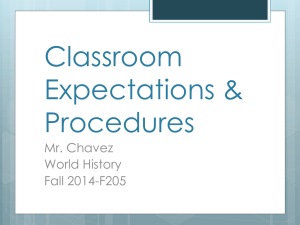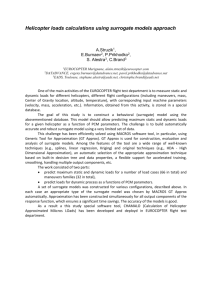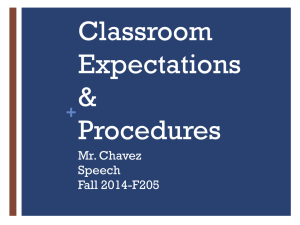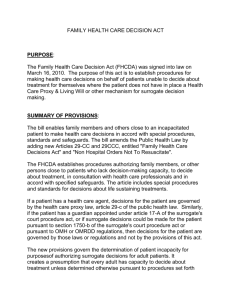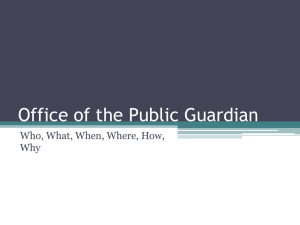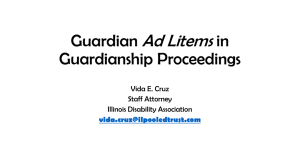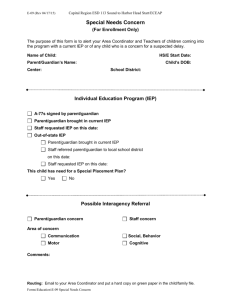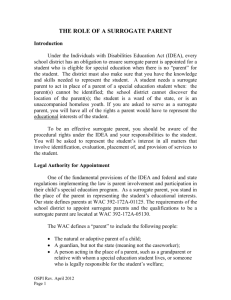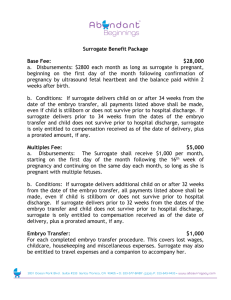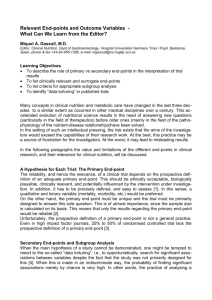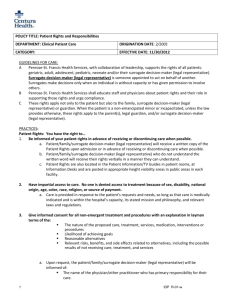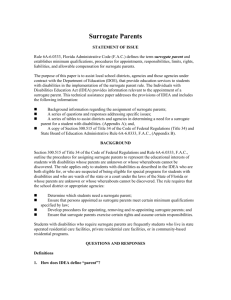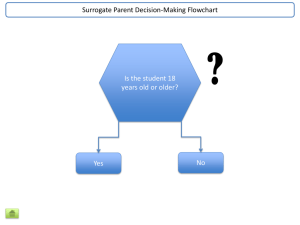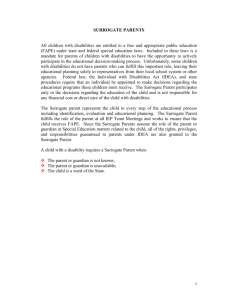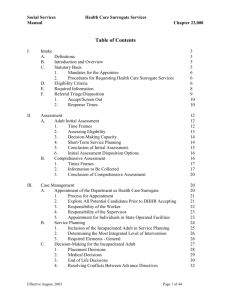Item 02 - Education Rights Holder
advertisement
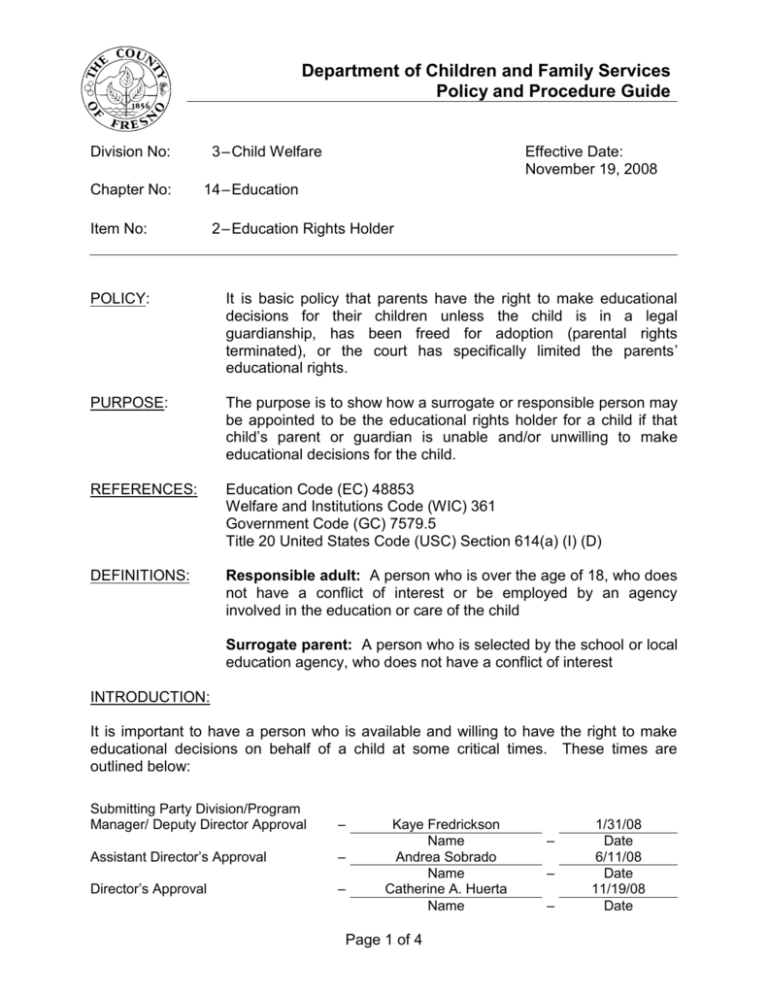
Department of Children and Family Services Policy and Procedure Guide 3 – Child Welfare Division No: Chapter No: Effective Date: November 19, 2008 14 – Education Item No: 2 – Education Rights Holder POLICY: It is basic policy that parents have the right to make educational decisions for their children unless the child is in a legal guardianship, has been freed for adoption (parental rights terminated), or the court has specifically limited the parents’ educational rights. PURPOSE: The purpose is to show how a surrogate or responsible person may be appointed to be the educational rights holder for a child if that child’s parent or guardian is unable and/or unwilling to make educational decisions for the child. REFERENCES: Education Code (EC) 48853 Welfare and Institutions Code (WIC) 361 Government Code (GC) 7579.5 Title 20 United States Code (USC) Section 614(a) (I) (D) DEFINITIONS: Responsible adult: A person who is over the age of 18, who does not have a conflict of interest or be employed by an agency involved in the education or care of the child Surrogate parent: A person who is selected by the school or local education agency, who does not have a conflict of interest INTRODUCTION: It is important to have a person who is available and willing to have the right to make educational decisions on behalf of a child at some critical times. These times are outlined below: Submitting Party Division/Program Manager/ Deputy Director Approval – Assistant Director’s Approval – Director’s Approval – Kaye Fredrickson Name Andrea Sobrado Name Catherine A. Huerta Name Page 1 of 4 – – – 1/31/08 Date 6/11/08 Date 11/19/08 Date Division 3, Chapter 14 Effective Date: November 19, 2008 Item 2 - Education Rights Holder I. II. SPECIAL EDUCATION A. The school district’s proposed assessment plan must be signed by the person holding education rights. B. Without this consent, the assessment cannot go forward unless 1. the child is a ward of the court and 2. the Local Educational Agency (LEA) cannot find the parent, the parent’s education rights’ have been terminated, or a judge has removed the parent’s educational rights and appointed another person to represent the child, or 3. it is an initial evaluation to determine eligibility GENERAL EDUCATION A. Enrollment, preference for regular school placement 1. B. Foster youth who are not in special education must attend a school operated by the local school district, unless a. the person with education rights determines that it is in the child’s best interest to be placed in another educational program or b. to continue in his/her school of origin School of origin 1. If a foster youth is moved to a new placement, a. the school district the child was initially attending must allow him/her to remain in his/her school of origin for the remainder of the academic school year provided it is in his/her best interest to do so b. the person with education rights, the child, and the school district foster care liaison determine the child’s best interest. Page 2 of 4 Division 3, Chapter 14 Effective Date: November 19, 2008 Item 2 - Education Rights Holder PROCEDURE: I. II. LIMITING THE EDUCATIONAL RIGHTS OF PARENTS A. When a school age child is first detained by the court the Emergency Response (ER) social worker must work with the parent or guardian in order to assess the parent’s ability and willingness to engage in the child’s educational progress. B. If the social worker sees that a child’s parent or guardian is unable and/or unwilling to make educational decisions for the child, the juvenile court can limit the parent or guardian’s educational rights. C. Additionally, if at any time the parent or guardian becomes unable or unwilling to make educational decisions for the child, the juvenile court can limit the parent or guardian’s educational rights for this child. APPOINTING A RESPONSIBLE ADULT TO MAKE EDUCATIONAL DECISIONS FOR THE CHILD A. At the same time that the court limits the educational rights of a parent or guardian, it must appoint a responsible adult to make decisions for the child, regardless of whether or not the child is receiving or in need of special education. B. The social worker, upon assessing that there is no parent or guardian able or willing to make educational decisions for the child will: 1. identify a responsible person who is willing and able to advocate for the child in educational matters 2. if unable to identify a responsible person, recommend to the court that it refer the child to the local educational agency for prompt appointment of a surrogate parent for the child (the local educational agency must notify the court of the identity of the appointee on the form JV536 within 21 calendar days of the date of the appointment, termination, or replacement of a surrogate parent) Page 3 of 4 Division 3, Chapter 14 Effective Date: November 19, 2008 Item 2 - Education Rights Holder III. C. The social worker will complete items 1 through 10 of the JV535, which requests the court suspend parental rights with respect to educational decisions for this child and appoint a responsible person or surrogate parent to have the educational rights for this child. D. If the child is later placed in a planned permanent living arrangement, the child’s caretaker assumes educational rights, and the previously appointed responsible adult or surrogate parent can no longer make educational decisions on behalf of the child. E. Despite the confusing use of two different terms, surrogate parents and responsible adults have the same rights and responsibilities. LENGTH OF APPOINTMENT SURROGATE PARENT A. AS A RESPONSIBLE PERSON OR Appointment as a responsible adult or surrogate parent lasts until 1. The child reaches 18 years of age 2. Students hold their own educational rights when they reach 18 unless the student has been determined to be incompetent under state law. 3. Another adult is appointed to make educational decisions 4. The educational rights of the parent or guardian are fully restored, or 5. The child is placed in a planned permanent living arrangement, at which time the foster parent, relative caretaker, or non-relative extended family member has the right to make educational decisions on behalf of the child. NOTE: the right to make educational decisions only transfers to the caregiver in a planned permanent living arrangement if education rights were previously limited. Page 4 of 4
